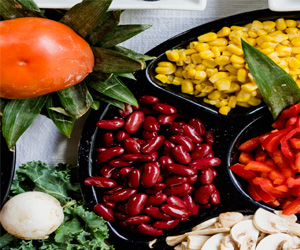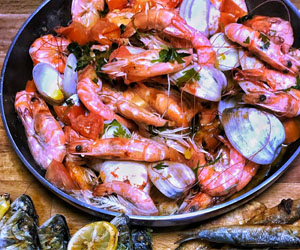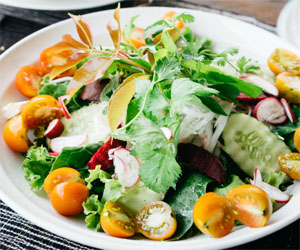


Making Smart Choices For A Better Lifestyle

In today's fast-paced world, where convenience often takes precedence over health, the quest for healthy alternatives has become a vital aspect of our daily lives. People are increasingly seeking out options that enable them to enjoy the flavors they love while making mindful choices that promote their well-being. In this article, we explore the concept of healthy alternatives and their impact on leading a balanced and nutritious lifestyle.
Defining Healthy Alternatives: Healthy alternatives are substitutions or modifications in our dietary and lifestyle choices that prioritize wellness. These alternatives aim to provide similar taste and satisfaction without compromising on health. They offer a way to indulge in the pleasure of eating while ensuring that our bodies receive the nourishment they require.
The Rationale For Healthy Alternatives:
The need for healthy alternatives arises from several factors:
1. Health Consciousness: A growing awareness of the importance of a balanced diet and active lifestyle has inspired individuals to seek healthier options. People are increasingly looking for ways to make their favorite dishes more nutritious.
2. Dietary Restrictions: For those with dietary restrictions or specific health concerns, such as allergies or sensitivities, healthy alternatives offer a way to enjoy favorite foods without adverse effects.
3. Weight Management: Healthy alternatives can be instrumental in weight management. They enable people to enjoy their favorite meals in a calorie-conscious manner, helping them maintain or achieve a healthy weight.
4. Lifestyle Diseases: The rise of lifestyle diseases such as diabetes, obesity, and heart conditions has encouraged individuals to adopt healthy alternatives to manage their health proactively.
Examples Of Healthy Alternatives:
Healthy alternatives span various aspects of life, including food and beverages, exercise, and daily routines. Some common examples include:
1. Food Substitutions: Using whole-grain flour instead of refined flour, opting for lean proteins over fatty cuts, or replacing sugary snacks with fruits are classic examples of dietary healthy alternatives.
2. Plant-Based Diets: Choosing a plant-based diet, rich in vegetables, fruits, legumes, and grains, is an excellent alternative to a diet high in animal products.
3. Low-Calorie Beverages: Drinking water, herbal tea, or sparkling water instead of sugary soft drinks or calorie-laden cocktails is a wise beverage alternative.
4. Exercise Routines: Engaging in low-impact exercises or yoga as an alternative to high-intensity workouts is a mindful choice for individuals with specific health conditions.
Benefits Of Healthy Alternatives:
The adoption of healthy alternatives offers numerous advantages, including:
1. Improved Health: Choosing healthier options can have a direct impact on physical health by reducing the risk of diseases, maintaining a healthy weight, and enhancing overall well-being.
2. Enhanced Energy: Healthier alternatives provide sustained energy levels and prevent sugar crashes or post-meal lethargy.
3. Better Mood: Proper nutrition and healthy choices can positively influence mood, cognitive function, and mental well-being.
4. Sustainable Lifestyle: Making healthy alternatives a part of one's daily routine contributes to a more sustainable and mindful lifestyle.
Practical Steps To Embrace Healthy Alternatives:
To incorporate healthy alternatives into your daily life, consider the following steps:
1. Education: Learn about healthier choices and understand their benefits for your specific health goals.
2. Gradual Transition: Make gradual changes to your diet and lifestyle to allow your taste buds and habits to adapt.
3. Experiment: Try new recipes, ingredients, and activities to discover what works best for you.
4. Seek Support: Join groups, communities, or consult with professionals who can offer guidance and support as you embark on your journey toward healthier living.
Healthy alternatives offer a practical and sustainable way to lead a balanced and nutritious lifestyle. They empower individuals to make mindful choices that enhance their overall health and well-being while enjoying the pleasures of life to the fullest. Embracing healthy alternatives is not about sacrifice; it's about a conscious decision to prioritize long-term health and vitality.
Health And Dietary Considerations
 Health Benefits
Health Benefits
For individuals with celiac disease or gluten sensitivity, adopting a gluten-free lifestyle is non-negotiable. Consuming gluten can lead to severe health consequences and discomfort. However, even for those without these conditions, there are potential health benefits to going gluten-free.
Some people report improved digestion, increased energy, and reduced gastrointestinal discomfort when they eliminate gluten from their diets. This could be attributed to the fact that many gluten-containing foods are also highly processed and high in refined carbohydrates. A gluten-free diet can encourage individuals to choose more whole and naturally gluten-free foods like fruits, vegetables, lean proteins, and legumes.
Potential Drawbacks
While the gluten-free lifestyle offers various benefits, it's essential to be mindful of potential drawbacks. A gluten-free diet can be challenging to maintain, as gluten is pervasive in many common foods.
Elevate Your Culinary Game With Clever Shortcuts
 4. Efficiency: Cooking hacks streamline the cooking process, making it more efficient. They allow you to multitask, so you're not chained to the stove, and they minimize the number of pots and pans you need to wash.
4. Efficiency: Cooking hacks streamline the cooking process, making it more efficient. They allow you to multitask, so you're not chained to the stove, and they minimize the number of pots and pans you need to wash.
5. Creativity: Hacks encourage experimentation and creativity in the kitchen. They open up new possibilities and inspire you to try new techniques and flavors.
Must-Know Cooking Hacks
Here are a few essential cooking hacks that can make your time in the kitchen more efficient and enjoyable:
1. Knife Skills: Mastering basic knife skills can save time and improve your safety in the kitchen. Learn to chop, dice, and slice like a pro to speed up meal prep.


The Unsung Hero Of Stress-Free Cooking
 2. Stress Reduction: A cluttered, dirty kitchen can contribute to stress and anxiety. Easy cleanup minimizes the chaos and promotes a sense of order and tranquility.
2. Stress Reduction: A cluttered, dirty kitchen can contribute to stress and anxiety. Easy cleanup minimizes the chaos and promotes a sense of order and tranquility.
3. Consistency: When cleanup is straightforward, you're more likely to cook at home more often. This promotes healthier eating habits and reduces reliance on takeout or dining out.
4. Culinary Exploration: The prospect of a time-consuming cleanup can deter people from trying new recipes and techniques. Easy cleanup encourages culinary exploration and experimentation.
5. Enhanced Creativity: A clean and organized kitchen can inspire creativity. You're more likely to try new ingredients and cooking methods when your workspace is free from clutter and mess.
Tips For An Easy Cleanup
Here are some practical tips to make your cleanup after cooking a stress-free experience:
A Culinary Journey Of Sensory Delights
 The Appeal Of Flavorful Feasts
The Appeal Of Flavorful Feasts
Why are flavorful feasts so appealing? Here are some compelling reasons:
1. Celebration: Flavorful feasts are often associated with special occasions, holidays, and gatherings. They serve as a way to commemorate and celebrate the moments that matter most.
2. Variety: These feasts offer a diverse selection of dishes that cater to different palates. From savory to sweet, from mild to spicy, there's something for everyone to enjoy.
3. Connection: Preparing and sharing a flavorful feast can strengthen bonds and create a sense of connection. It's a communal experience that fosters togetherness.
4. Sensory Delights: The combination of flavors, aromas, and textures in a flavorful feast creates a sensory adventure. It's a delightful exploration of the culinary world.
5. Tradition: Many flavorful feasts are rooted in tradition, carrying the legacy of generations. They provide an opportunity to pass down family recipes and customs.
The Art Of Crafting Flavorful Feasts
Creating a flavorful feast is an art that requires thought, care, and attention to detail. Here are some tips for crafting a memorable and delicious feast:
1. Plan Ahead: Start planning your feast well in advance. Consider the number of guests, dietary restrictions, and the dishes you'd like to feature.
A Journey Through The World Of Fine Brews
 2. The Art Of Roasting: Understanding the roasting process is central to coffee connoisseurship. The connoisseur seeks to identify roast levels, discovering the subtle differences between light, medium, and dark roasts, and the effects on flavor and aroma.
2. The Art Of Roasting: Understanding the roasting process is central to coffee connoisseurship. The connoisseur seeks to identify roast levels, discovering the subtle differences between light, medium, and dark roasts, and the effects on flavor and aroma.
3. Brewing Mastery: A connoisseur becomes well-versed in brewing methods, experimenting with techniques like pour-over, French press, AeroPress, espresso, and cold brew. They perfect their brewing skills to unlock the full potential of each coffee bean.
4. Exploration Of Coffee Cultures: Coffee connoisseurs often delve into the coffee cultures of different regions. They explore the traditions and rituals associated with coffee, from the espresso bars of Italy to the coffee ceremonies in Ethiopia.
 3. Slow Cooking: Slow cooking is a hallmark of Mediterranean cuisine. Stews and braised dishes are prepared with patience and love, allowing flavors to meld together harmoniously. Iconic dishes like Italian Osso Buco, Greek stifado, and Moroccan tagine exemplify the art of slow cooking.
3. Slow Cooking: Slow cooking is a hallmark of Mediterranean cuisine. Stews and braised dishes are prepared with patience and love, allowing flavors to meld together harmoniously. Iconic dishes like Italian Osso Buco, Greek stifado, and Moroccan tagine exemplify the art of slow cooking.
4. Seasoning With Fresh Herbs: Mediterranean cooking methods emphasize the use of fresh herbs like basil, oregano, thyme, and rosemary. These herbs not only infuse dishes with an aromatic depth but also contribute to the health benefits of the Mediterranean diet.
5. Baking And Gratin: Baking is prevalent in Mediterranean cooking, especially for making bread and pastries. Flatbreads like pita and focaccia are baked to perfection.
The Cornerstones Of Health And Wellness
 The Essence Of Nutrient Density: Nutrient-rich foods are characterized by their high nutrient density. This means they pack a significant amount of essential nutrients per calorie, giving you the most "bang for your buck" in terms of health. These foods are not empty calories but are abundant sources of vitamins, minerals, antioxidants, and other valuable compounds.
The Essence Of Nutrient Density: Nutrient-rich foods are characterized by their high nutrient density. This means they pack a significant amount of essential nutrients per calorie, giving you the most "bang for your buck" in terms of health. These foods are not empty calories but are abundant sources of vitamins, minerals, antioxidants, and other valuable compounds.
Variety Of Nutrient-Rich Foods: The world of nutrient-rich foods is diverse and versatile. It includes:
Fruits And Vegetables: Fruits and vegetables are teeming with vitamins, minerals, and dietary fiber. They offer a wide range of colors, flavors, and textures, making it easy to incorporate them into your daily meals.
A Delicious Journey Through Nature's Bounty
 Flavors At Their Peak: Foods that are in season are at their peak in terms of flavor and nutritional value. These foods are harvested at the perfect time, allowing them to develop their full flavor potential. A ripe, in-season tomato, for example, bursts with flavor that is unparalleled in taste when compared to its off-season counterpart. The taste of seasonal produce is a testament to the magic of nature.
Flavors At Their Peak: Foods that are in season are at their peak in terms of flavor and nutritional value. These foods are harvested at the perfect time, allowing them to develop their full flavor potential. A ripe, in-season tomato, for example, bursts with flavor that is unparalleled in taste when compared to its off-season counterpart. The taste of seasonal produce is a testament to the magic of nature.
Nutritional Benefits: Seasonal eating offers a variety of health benefits. Seasonal fruits and vegetables are rich in essential vitamins, minerals, and antioxidants. Since they are picked at their peak, they often contain more nutrients than out-of-season produce that has been transported long distances or stored for extended periods.
Environmental Sustainability: Embracing seasonal eating also aligns with eco-conscious living. When you choose foods in season, you reduce the need for long-distance transportation and energy-intensive methods of preservation. This, in turn, lowers your carbon footprint and supports local agriculture. It's a sustainable approach that promotes environmental health and resilience.
The Power Of Food Beyond The Body
 At its core, nourishing the soul through food is about more than filling our bellies; it's about filling our hearts and spirits. This concept is deeply rooted in the idea that food can offer comfort, healing, and a sense of connection. Here are some ways in which food nourishes our souls:
At its core, nourishing the soul through food is about more than filling our bellies; it's about filling our hearts and spirits. This concept is deeply rooted in the idea that food can offer comfort, healing, and a sense of connection. Here are some ways in which food nourishes our souls:
Comfort And Familiarity: There's a reason why certain foods are called "comfort food." These are the dishes that evoke a sense of nostalgia, reminding us of simpler times and the warmth of home. Whether it's a steaming bowl of chicken soup or a slice of homemade apple pie, these foods provide a feeling of comfort that nourishes the soul and eases stress.
Cultural Connection: Food is a powerful means of connecting with one's cultural roots. Traditional dishes and recipes passed down through generations carry the history and identity of a community. Preparing and savoring these foods is a way of staying connected to one's cultural heritage and, in turn, nourishing the soul.
Shared Experiences: Food has a unique ability to bring people together. Sharing a meal with loved ones, friends, or even strangers can foster a sense of community and belonging.